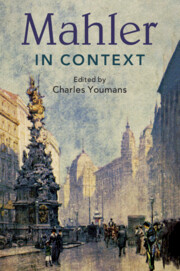Book contents
- Mahler in Context
- Composers in Context
- Mahler in Context
- Copyright page
- Dedication
- Contents
- Figures
- Music Examples
- Notes on Contributors
- Preface and Acknowledgments
- Abbreviations
- Part I Formation
- Part II Performance
- Part III Creation
- Chapter 12 The Composer “Goes to Press”
- Chapter 13 Mahler and Program Music
- Chapter 14 Intertextuality in Mahler
- Chapter 15 The Symphony, 1870–1911
- Chapter 16 Mahler and the Visual Arts of His Time
- Chapter 17 Mahler and Modernism
- Chapter 18 Reception in Vienna
- Chapter 19 Mahler’s Press from London to Los Angeles
- Part IV Mind, Body, Spirit
- Part V Influence
- Further Reading
- Index
Chapter 19 - Mahler’s Press from London to Los Angeles
from Part III - Creation
Published online by Cambridge University Press: 18 December 2020
- Mahler in Context
- Composers in Context
- Mahler in Context
- Copyright page
- Dedication
- Contents
- Figures
- Music Examples
- Notes on Contributors
- Preface and Acknowledgments
- Abbreviations
- Part I Formation
- Part II Performance
- Part III Creation
- Chapter 12 The Composer “Goes to Press”
- Chapter 13 Mahler and Program Music
- Chapter 14 Intertextuality in Mahler
- Chapter 15 The Symphony, 1870–1911
- Chapter 16 Mahler and the Visual Arts of His Time
- Chapter 17 Mahler and Modernism
- Chapter 18 Reception in Vienna
- Chapter 19 Mahler’s Press from London to Los Angeles
- Part IV Mind, Body, Spirit
- Part V Influence
- Further Reading
- Index
Summary
Mahler liked to present himself, especially in letters, as an unrecognized genius whom future audiences would honor even if contemporaneous critics remained dismissive. If he had cause for disappointment with the German-language press, the foreign press often recognized his accomplishments. This essay focuses on Mahler coverage in the press in England, New York, and California, where positive reports and unflagging curiosity defy any presumptions of provincialism. Far-flung publications admired the conductor, awed if perplexed by his compositions, at a time when their Austro-German counterparts disparaged his music. Their attention did not result from a more profound understanding than in Central Europe; rather, staying abreast of foreign affairs, including musical ones, was a mark of cultivation. The stakes were simply not as high as in Vienna and in Germany, where protecting the integrity of classical music against the claws of modernism underlay so much reporting on Mahler.
- Type
- Chapter
- Information
- Mahler in Context , pp. 162 - 170Publisher: Cambridge University PressPrint publication year: 2020

